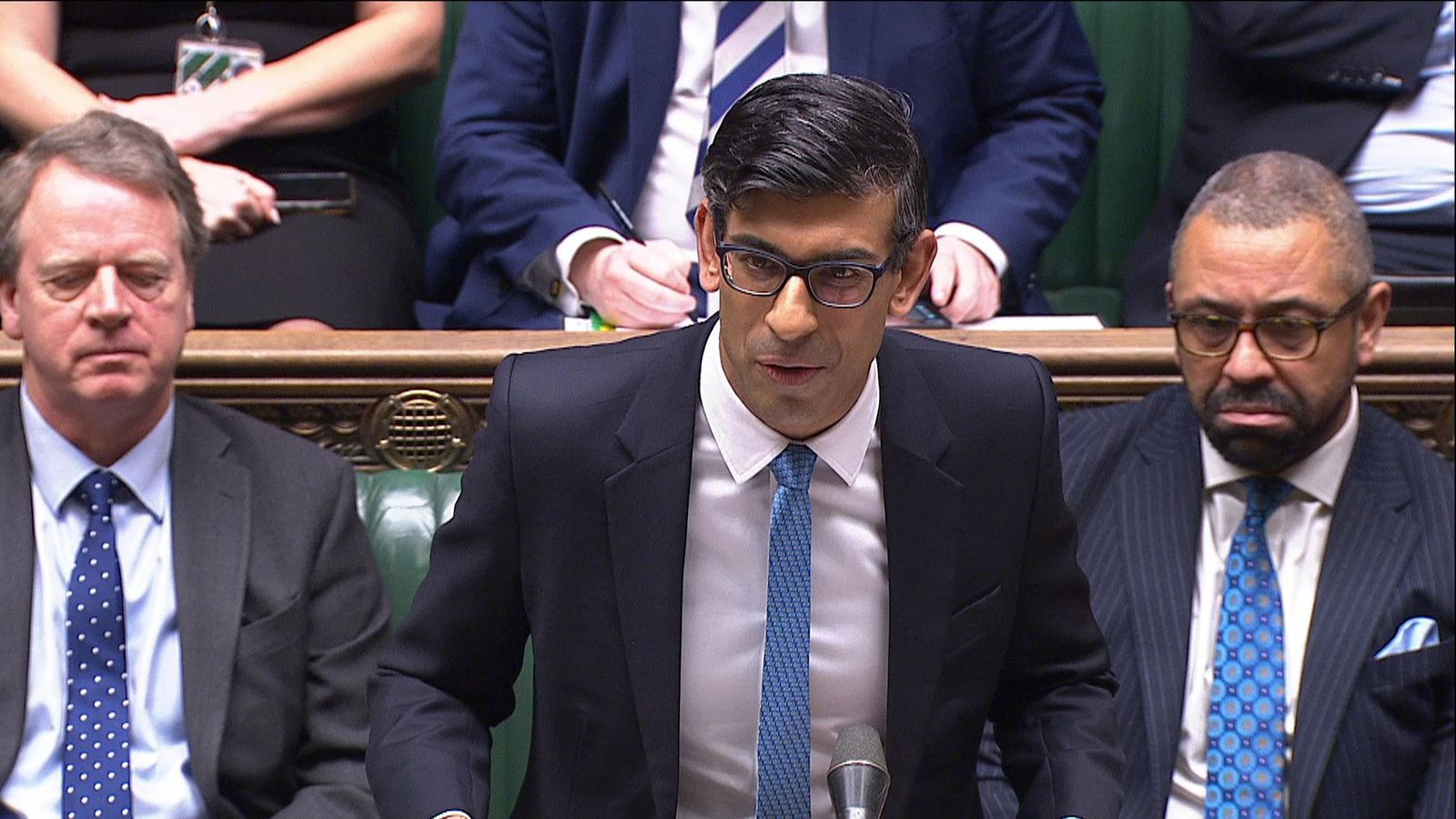Brexit: Rishi Sunak suggests MPs will get vote on Northern Ireland deal

Rishi Sunak has indicated that he would put any new Brexit deal on Northern Ireland to a vote, in a move that risks a showdown with Eurosceptics on the Tory benches.
The prime minister said parliament will get to “express its view” following a grilling from Labour leader Sir Keir Starmer on what the settlement with Brussels might look like, and whether MPs will have a say on it.
Mr Sunak promised to be “resolute” in defending Northern Ireland as he seeks a deal to rewrite the terms of its post-Brexit arrangements.
He said he was a “Conservative, a Brexiteer and a unionist”, and any agreement over changes to arrangements of the contentious Northern Ireland Protocol must tick those three boxes.
Politics live: Sunak facing Starmer at PMQs as Brexit tensions bubble
However, he would not say if the deal he is discussing would remove the application of EU rules in the region or the oversight of the European Court of Justice (ECJ) – a key sticking point for many Tories and DUP politicians.
Sir Keir said despite cheers from Conservative MPs during PMQS “the prime minister is pulling the wool over their eyes”.
He added: “It’s the 25th anniversary of the Good Friday Agreement. Politics in Northern Ireland is built on trust, not telling people what they want to hear.”
He asked: “Can the prime minister confirm that whatever deal he brings back – this House will get a vote on it?“
Advertisement
Mr Sunak replied “of course parliament will express its view” – which Sir Keir said he took to mean there will be a vote.
However, when asked to confirm if that was the case, the prime minister’s official spokesman cautioned that they would “not get into hypotheticals” adding: “There is nothing to vote on yet, we don’t have a deal.”
Sir Keir once again offered to give his party’s support to a Brexit deal, telling MPs: “Everyone knows the basis of this deal has been agreed for weeks but it’s the same old story: the country has to wait while he plucks up the courage to take on the malcontents, the reckless, the wreckers on his own benches.
“But I’m here to tell him that he doesn’t need to worry about that because we will put country before party and ensure the Labour votes to get it through.
“He should accept our offer, ignore the howls of indignation from those on his side, who will never take ‘yes’ for an answer. Why doesn’t he just get on with it?”
Mr Sunak replied: “What I am doing is talking and listening to the people of Northern Ireland. That is the right thing to do.”
Read more:
What is the Northern Ireland Protocol and why does it matter?
What is the Brexit deal being discussed between UK and EU?
PM holds ‘intensive talks’ with EU
The protocol was put in place as part of Boris Johnson’s “oven-ready” Brexit deal to avoid a hard border on the island of Ireland, which all sides agreed was necessary to preserve peace.
But unionists are unhappy about the economic barriers it has created on trade being shipped from Great Britain to Northern Ireland, with a customs border effectively imposed in the Irish Sea – something the former prime minister promised would not happen
There is also anger over the so-called “democratic deficit” caused by Northern Ireland still being subject to some EU rules so that goods can move freely into the Republic of Ireland – which unionists and Tory MPs see as an erosion of the UK’s sovereignty and incompatible with the aims of Brexit.
The PM’s spokesman said Mr Sunak had engaged in “intensive talks” with EU chief Ursula von der Leyen last night as he battles to reach a new deal, and that the discussions so far have been “very constructive”.
The prime minister is under pressure to meet the “seven tests” of Belfast’s Democratic Unionist Party (DUP) if he wants power-sharing in Northern Ireland to be restored – after they pulled out of the arrangement early last year in protest at the protocol.
Read More:
Break-up of UK ‘at stake’ if protocol not fixed, warns DUP
Brexit deal ‘not close’: Senior Tory dampens down prospect of resolution
Sir Jeffrey Donaldson, the party’s leader, said during PMQs the protocol must be “replaced with arrangements that are acceptable and restore our place in the UK and its internal market”.
Mr Sunak insisted he heard “loud and clear” what the party wants and “addressing the democratic deficit is an essential part of the negotiations”.
